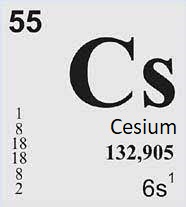Cesium is a highly reactive alkali metal with the atomic number 55 and symbol Cs.

Physical properties of cesium
Here are some of its physical properties:
- State: Cesium is a soft, silvery-gold metal that is liquid at or near room temperature.
- Melting and boiling point: Cesium has a low melting point of 28.5 °C (83.3 °F) and a low boiling point of 671 °C (1,240 °F).
- Density: Cesium is one of the least dense metals, with a density of 1.93 grams per cubic centimeter.
- Atomic radius: Cesium has the largest atomic radius of all elements in the periodic table, due to the relatively low effective nuclear charge experienced by its valence electron.
- Electrical conductivity: Cesium is a good conductor of electricity, and its conductivity is the highest of all metals except for silver and copper.
- Reactivity: Cesium is one of the most reactive elements, and reacts explosively with water to produce hydrogen gas and a solution of cesium hydroxide. It also reacts vigorously with many other substances, such as halogens and acids.
Overall, cesium has unique physical properties, such as its low melting point, low boiling point, and high reactivity, that make it a valuable element for various applications in science and technology.
Сhemical properties of cesium
Here are some of its chemical properties:
- Reactivity: Cesium is the most reactive metal of all the alkali metals. It reacts explosively with water to produce hydrogen gas and a solution of cesium hydroxide. It also reacts vigorously with other substances, such as halogens and acids.
- Oxidation states: Cesium has only one stable oxidation state, which is +1. This means that cesium loses one electron to form a positive ion when it reacts with other elements.
- Electronegativity: Cesium is one of the most electropositive elements, which means that it readily gives up its valence electron in chemical reactions.
- Chemical compounds: Cesium can form a variety of chemical compounds, including halides, carbonates, nitrates, and sulfates. Some of the most important cesium compounds include cesium chloride, cesium carbonate, and cesium nitrate.
- Isotopes: Cesium has 39 known isotopes, but only one stable isotope, cesium-133. Cesium-137, a radioactive isotope, has important applications in scientific research and in the medical field for radiation therapy.
Overall, cesium’s high reactivity and unique chemical properties make it a valuable element for various applications in science and technology. However, due to its reactivity and potential health hazards, cesium must be handled with care and proper safety precautions.
Use of cesium
Cesium has a variety of uses and applications in science, technology, and medicine, including:
- Atomic clocks: Cesium-133 is used as a reference for atomic clocks, which are the most accurate time-keeping devices available today.
- Catalysts: Cesium compounds are used as catalysts in organic chemistry reactions, such as the preparation of certain pharmaceuticals.
- Ion engines: Cesium is used in ion engines, which are a type of propulsion system used in spacecraft. Ion engines use an electric field to accelerate and expel cesium ions, which provide thrust for the spacecraft.
- Radiation therapy: Cesium-137 is used in radiation therapy to treat certain types of cancer, such as cervical cancer and uterine cancer.
- Glass manufacturing: Cesium is used in the production of glass, as it can improve the durability and heat resistance of certain types of glass.
- Petroleum exploration: Cesium is used as a tracer element in petroleum exploration, as it can help identify underground oil and gas deposits.
- Spectroscopy: Cesium is used in atomic absorption spectroscopy, a technique used to determine the concentration of elements in a sample.
Overall, cesium’s unique physical and chemical properties make it a valuable element for various applications in science and technology. However, due to its reactivity and potential health hazards, cesium must be handled with care and proper safety precautions.
